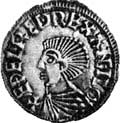Æthelred was the son of King Eadgar and Ælfthryth and the half-brother of King Eadweard. Æthelred was a minor when he acceded to the throne after the violent death of Eadweard in 978. Reasonable suspicions that Æthelred's mother may have had a part in eliminating her stepson caused distrust and disloyalty to the new king and his councilors. The early years of Æthelred's reign were dominated by the influence of Ælfthryth and Æthelwold, Bishop of Winchester. In 984 Ælfthryth ceased witnessing her son's charters and Æthelred assumed the reigns of government. Ælfthryth was banished from court in 985. In 980s the Vikings resumed their raids on England, but Æthelred's government was only able to put up a feeble defense against the invaders. The raids continued for a number of years, but it had mainly local consequences. In 991 the Danes under King Sweyn of Denmark utterly destroyed an English army under Byrhtnoth at the Battle of Maldon. Æthelred was forced to pay heavy tributes (Danegeld) in 991, 994, and 1002. During these years, Æthelred relied on greedy counselors, who succeeded in seizing church lands and reducing the power of monasteries. Ælfthryth's return marked the beginning of a more stable period, when literature and other artwork flourished. However, the heavy terms of truces with the Vikings affected the internal affairs. Unable to deal effectively with the invaders, Æthelred ordered all Danes in England to be put to death on St. Bryce's Day (13 Nov 1002). In response to the massacre, Sweyn's fleet plundered and looted the whole country until the famine of 1005 forced him to return to Denmark. An upheaval of the king's council in 1006 was followed by the period of dominance of Eadric Streona, who became ealdorman of the Mercians (1007) and married Æthelred's daughter, Eadgyth. A tribute of £36,000 was paid in 1007 to avert another invasion of the Danes. A huge English fleet built on orders of Æthelred was mostly destroyed by storm during the expedition against rebellious noble Wulnoth (1009). From 1009 to 1012 southern England was ravaged by Thorkell the Tall, who finally received the payment of tribute of £48,000 (1012). Nevertheless, Sweyn invaded England in the summer of 1013 and forced Æthelred to flee to the Isle of Wight, where he stayed over Christmas, and early in January 1014 crossed over to Normandy. Æthelred and his family found refuge at the court of Richard II, his wife's brother and duke of Normandy. With the death of Sweyn (3 Feb 1014), the Danish fleet proclaimed Cnut as their king. Æthelred was recalled from exile by his councilors and nobles and arrived in Lent 1014. After a short visit to Denmark, Cnut renewed the invasions and was joined by Eadric Streona and other thanes, who betrayed his king. Æthelred was in London when Cnut was preparing to lay siege to the city. He died on St. George's day (23 Apr 1016) leaving England divided. Biography sources: [3][4][5][6] |

